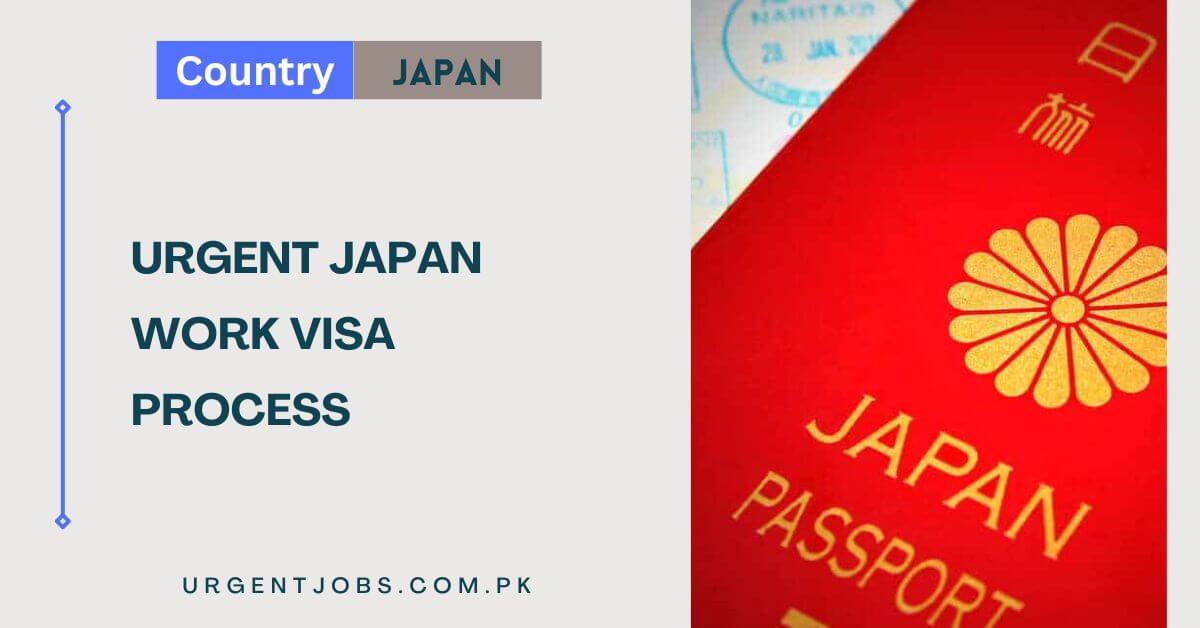Urgent Japan Work Visa Process 2024 – Visit Now

The process for obtaining a work visa for Japan is simple and fast. We previously discussed the Lithuanian Work Visa and the Slovenian Work Visa. This article describes how to obtain a work visa for Japan. If you wish to work in Japan, a job offer from a Japanese employer is required. And there are numerous jobs in Japan in a variety of disciplines that will sponsor your visa. It is simple to find a job that will pay for your visa in Japan.
Japan requires workers from other nations because the majority of Japanese citizens are aging. Japan plans to hire 500,000 people from other countries by 2025. Initially, the visa will be valid for five years. People in Japan adore one another very much. They never utter a lie. Self Regulated. A nation that can be purchased. In this post, I will discuss the various types of Japanese work visas, the jobs in Japan that can help you obtain a work visa, and the necessary steps to obtain a Japanese work visa.
Details of Urgent Japan Work Visa Process
- Job Country: Japan
- Visa Type: Work Visa
- Who can Apply: Anyone from any country
- Visa Sponsorship Jobs: Yes
- Passport Ranking: 2nd Powerful, 190 Visa-Free Destinations
Benefits of Japan Work Visa Process
For Individuals:
- Employment Possibilities: Work visas allow individuals to acquire exposure to new job markets, industries, and professional experiences by working in a foreign country.
- Ability Improvement: Working abroad frequently requires acquiring new skills, adjusting to new work environments, and gaining exposure to a variety of cultural perspectives. This can improve a person’s skill set and their future career prospects.
- Increased Earnings: Many individuals choose to work abroad due to the possibility of earning more money than in their home countries. Pay scale disparities, currency exchange rates, and the demand for particular talents can all be contributing factors to this.
- Cultural Knowledge: Working in a foreign country enables individuals to immerse themselves in a new culture, acquire new languages, and gain a greater appreciation for global diversity.
- The value of networking: Working abroad affords the opportunity to establish international connections and develop a professional network that can be beneficial throughout one’s career.
- Persona Development: As individuals navigate new challenges and experiences, living and working in a foreign environment can foster personal development, resiliency, and adaptability.
- Possibility of Permanency: Depending on their circumstances and the host country’s immigration policies, some individuals on work visas may be eligible to petition for permanent residency or citizenship.
For Host Countries:
- Abilities and Competence: Work visas enable host nations to attract skilled workers and specialists in disciplines where there may be personnel shortages. This may contribute to economic expansion and technological progress.
- Economic Stimulus: Foreign workers with work visas frequently contribute to the local economy by purchasing products and services, paying taxes, and even launching their own businesses.
- Diversity and Originality: By bringing together individuals with various perspectives, experiences, and ideas, a diverse workforce can foster innovation. This can enhance the creative and entrepreneurial environment of the host nation.
- Workforce Flexibility: Work visas can provide a flexible labor force capable of filling seasonal, transient, or specialized positions without significantly impacting the domestic job market.
- Cultural Interaction: The presence of foreign employees fosters cultural exchange, fostering mutual understanding and goodwill between the host country and the workers’ home countries.
- Investigation and Development: Skilled employees with work visas can contribute to research and development in a variety of industries, thereby fostering technological progress and advancements.
- Adapting to Demographic Alterations: Work visas can help countries with aging populations and diminishing labor forces address labor shortages and sustain economic growth.
Popular Industries
- English teacher
- Military personnel
- Engineer
- Service staff
- IT Professional
- Translator
- Banker
- School Teacher
- English Speaking
- Mechanics
- Electrical
Popular Jobs
The most in-demand professions in Japan are English teaching and IT positions. Additionally, these occupations provide work visa sponsorships, housing, and high pay.
Types of Japan Work Visa Process
There are numerous varieties of visas, but only two types of work visas for Japan, each of which is further subdivided into categories. The various types of Japanese employment visas are as follows:
Highly Skilled Professional Visa
Highly skilled professional (i) (a)/(b)/(c)
With this visa, highly qualified individuals are permitted to remain in Japan for five years and engage in advanced academic study, advanced specialized work, or technical labor.
Special Highly Skilled Professional
This visa requires a bachelor’s or master’s degree, and if you have experience in your field, you can apply for a highly skilled visa.
Highly skilled foreign professional
This work visa is also for those with advanced talents and experience who wish to work in Japan.
Japan Working visa
This is a standard Japanese work visa issued to a large number of foreign employees. For this visa, prior employment experience is not required. This visa allows you to remain for 1, 3, or 5 years.
Check Also: Work Visa Process in Spain – Visit Now
Professions that are Eligible for Japan Working Visa
The Japanese Foreign Ministry compiled this list. Employment eligible for a Japanese Working Visa:
- Professor
- Artists
- Religious activities
- Journalist
- Business Manager
- Legal/Accounting services
- Medical services
- Researcher
- Instructor
- Engineer/Specialist in humanities/International services
- Intra-company transferee
- Nursing care
- Entertainers
- Skilled labor
- Specified skilled worker
- Technical intern training
Stay Duration
All Visas are issued for a period of 1, 3, and 5 years
Processing Time
In 5–6 business days, you will receive a response regarding your visa application.
What is Visa Cost?
Typically, a single-entry visa costs approximately 3000 Japanese yen. While the Multiple Entry Visa for Japan costs roughly 6,000 yen, Only if your application is approved is the fee due.
Requirements for Japan Work Visa Process
- You must have an employment offer from a Japanese employer or supervisor.
- You need to have a valid passport.
- You must complete and submit the visa application form.
- You must submit a photograph that is no older than six months.
- Employers in Japan must provide you with a Certificate of Eligibility.
Required Documents
- Valid passport
- One registration form for visas
- One photographic image
- Certificate of Qualification
- Employment proposition letter containing all pertinent information.
- Educational Materials
Visa Sponsorships Jobs in Japan for Foreign Applicants
In Japan, there are numerous visa sponsorship jobs. These positions are available through the company, a recruitment agency, and the company itself.
I have compiled a list of the most prominent Find Jobs in Japan websites. When visiting these websites, Click “Overseas Applicants” or “Visa Offered” or input “Visa Sponsorship” into the search bar.
Where to Submit Your Japanese Work Visa Application
Listed below are the procedures required to apply for a Japanese work visa.
How to Obtain a Certificate of Eligibility Applying for a Japan Work Visa at the Japanese office of your country A catalog of Japanese embassies, consulates, and permanent missions can be found here.
Frequently Asked Questions:
Is Japan opening a work visa for Pakistan?
Pakistan has now joined 9 other countries, including the Philippines, Thailand, Indonesia, Cambodia, Mongolia, Vietnam, Uzbekistan, Nepal, Sri Lanka, and Bangladesh, in announcing Japan’s new immigration and work visa policy.
Is it difficult to get a working visa in Japan?
It is difficult to obtain a work visa for jobs that do not require special skills. The second most common type of qualification after technical training is the engineer, humanist, or international service qualification.
What is the age limit for a Japan visa?
Both include being between 18 and 30 years of age at the time of visa application. As for Australia, Canada, the Republic of Korea, and Ireland, an applicant must be between 18 and 25 years of age except in cases where the competent authorities of Japan agree to raise the age limit to 30 years.




